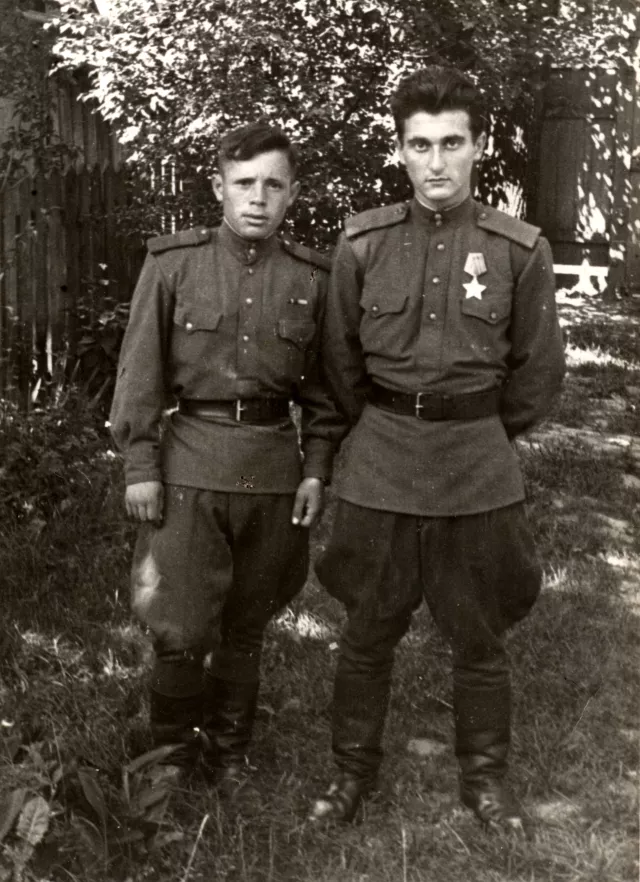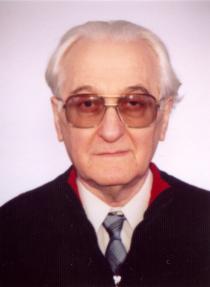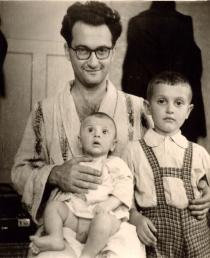The picture was made on the occasion of the end of World War II in 1945. This is me to the right. Next to me is my fellow soldier Vyacheslav Dedov, who came up accidentally. The order of Soldiers' Fame is on my chest. The picture was made in Vilnius.
On the 21st of June 1941 the Great Patriotic War was unleashed. By the evening of the Sunday, 22nd of June we left the town on foot. There were four of us - the families of aunt Shifra and mother's younger sister Rahil. We arrived in the town of Kirov [850 km to the east from Moscow]. We and the family aunt Shifra were sent to some kolkhoz in Kirov oblast. First I was involved in agricultural works and then in carpentry. I dreamt of studies in spite of the war. I still thought of entering the institute. When Moscow Teachers' Training Institute was evacuated in Kirov, I was enrolled for the first course of Physics and Mathematics department. It was easy for me to study and I did well.
I had studied only for a year and a half. At the beginning of 1943 I was drafted in the front-line forces. I was sent to the newly-formed Lithuanian division # 16, positioned in the town of Balakhna, Nizhniy Novgorod. I had spent couple of months training and was sent to the front shortly afterwards. In summer 1943 I turned out to be on the leading edge. I was a private in the infantry. It was the hardest and most dangerous military profession. We always were the first to confront the enemy face -to-face. Our division was the part of the First Baltic front. We swiftly moved along the territory of Russia, then Ukraine and further to the West. I was not a coward. I was one of the first who rushed in the attack. Before one of the fiercest battles I joined the Communist party.
During one of the most serious battles I was ahead of everybody. I jumped in the enemy's trench and killed the fascists who were there. I was conferred with the Order of Fame for this battle. Soon I was elected a Komsomol organizer of the squad and became the aide of the political officer. I was to follow the rounds-up of the fronts, estimate political situation. The war was about to end and the front was advancing to the Western borders of the USSR. In summer 1944 my motherland Lithuania was liberated.
At the end of 1944 the invitation for the officers' courses was sent to our regiment. It was suggested that I should go there. I did not want to be a career soldier as I did not like military service. I wanted to continue my studies at the institute.But still, I agreed. I even do not know why. Probably, because I was highly responsible. I left for the courses, which were to last for 3 months. We settled in Riga. When the war moved to Eastern Prussia, we were sent to the former German Kaliningrad region, having been liberated by soviet troops. We met victory here. We were exulting. We were so happy to know that the war was over and now it was the time to think of our future. We had been already conferred the officers' rank and I became a junior lieutenant. Shortly after our victory we were allocated to different military units. I was sent Vilnius and assigned Komsomol organizer of regiment # 249, where I used to serve. First I lived in the barracks with everybody. Our regiment was in Severny Gorodok, it was the name of one of the outskirts of Vilnius.
In 1946 many people left Vilnius for Poland and many apartments were empty. I was given a small two-room apartment with a kitchen, but without conveniences. Finally, we had our own house and we settled there with mother. I had been writing the requests on demobilization, but they were returned to me unsigned. I was demobilized only in 1947. I was happy. The only thing for me to do was to find a job and go to the institute.
Isroel Lempertas and his fellow soldier Vyacheslav Dedov
The Centropa Collection at USHMM
The Centropa archive has been acquired by the United States Holocaust Memorial Museum in Washington, DC.
USHMM will soon offer a Special Collections page for Centropa.
Academics please note: USHMM can provide you with original language word-for-word transcripts and high resolution photographs. All publications should be credited: "From the Centropa Collection at the United States Memorial Museum in Washington, DC". Please contact collection [at] centropa.org.















